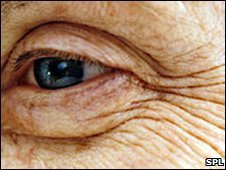
Sun damage causes wrinkles
|
A cream used to treat pre-cancerous skin lesions also reverses signs of ageing, a study reveals. Fluorouracil improved wrinkles, dark spots, shadows and sallowness, as well as its intended effect of removing suspect growths from sun damaged skin. Patients with pre-cancerous actinic keratoses can expect younger-looking skin as a side effect of the treatment, Archives of Dermatology reports. The US authors warn some will seek to capitalise this cosmetic effect. But experts advised against using the drug for purely cosmetic reasons, saying that it could cause severe skin reactions. The treatment encourages the body to make healthy new skin by purposefully damaging the outermost layer of the skin, much like chemical peels and laser treatment.
And being cheaper, it is an attractive alternative to laser therapy. In trials on 21 volunteers with actinic keratoses and sun-damaged skin fluorouracil cream applied twice a day for two weeks led to significant improvements - removing precancerous skin patches and reversing some of the signs of sun damage. The US scientists led by Dr Dana Sachs, from the University of Michigan Medical School in Ann Arbor, said: "Undoubtedly, there will be patients who desire a therapy such as topical fluorouracil for cosmetic purposes given the relatively low cost of this therapy compared with ablative laser resurfacing." Added bonus And patients with actinic keratoses may also be lured by the cosmetic added bonus, they said. "For patients in whom a course of topical fluorouracil is indicated for the treatment of actinic keratoses, there will likely be the additional benefit of a restorative effect from sun damage; this may provide further motivation for these patients to undergo rigorous treatment." Although the treatment was generally well tolerated, he said some might find it cosmetically unacceptable because of the associated signs of skin damage it causes, including redness and scabbing, which can last for several weeks. But Nina Goad of the British Association of Dermatologists said: "This chemotherapy cream is known to be an effective treatment for pre-cancerous changes due to the sun. "However, it can produce severe redness, oozing, weeping and scabbing of skin in many patients which can be very distressing for patients. "Although this is a useful treatment for pre-cancerous skin changes, the risk of a severe reaction would probably put off most people looking for a solution to cosmetic concerns. "The best way to avoid wrinkles is to avoid too much sun." Chris Flower, of the Cosmetic, Toiletry and Perfumery Association, said although the study might be of academic interest, the cream was not a cosmetic, and was not being promoted as such by the cosmetics industry. "In fact fluorouracil, the active ingredient in Efudix, is banned from use in cosmetics in the EU under the strict laws controlling the manufacture of cosmetic products."
|
Bookmark with:
What are these?